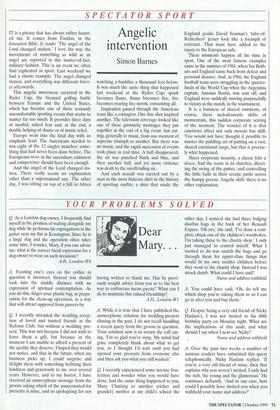SPECTATOR SPORT
Angelic intervention
Simon Barnes
IT is a phrase that has always rather haunt- ed me. It comes from Exodus, in the Jerusalem Bible. It reads: 'The angel of the Lord changed station.' I love the way the movements of something as wild as an angel are reported in this matter-of-fact, military fashion. This is an event we often find replicated in sport. Last weekend we had a classic example. The angel changed station, and everything was different forev- er afterwards.
This angelic movement occurred in the Ryder Cup, the biennial golfing battle between Europe and the United States, which has become one of those seriously uncomfortable sporting events that seems to matter far too much. It provides three days of morbid, naked fear and, at the end, a double helping of shame or of manic relief. Europe went into the final day with an emphatic lead. The Americans needed to win eight of the 12 singles matches; some- thing that had never been done before. The Europeans were in the ascendant; calmness and competence should have been enough. And the angel of the Lord changed sta- tion. There really seems no explanation other than a supernatural one. The other day, I was sitting on top of a hill in Africa watching a bushfire a thousand feet below. It was much the same thing that happened last weekend at the Ryder Cup: spark becomes flame, flame becomes fire, fire becomes roaring fire-storm, consuming all.
Inspiration passed through the American team like a contagion. One fine shot inspired another. The television coverage looked like one of those gimmicky montages they put together at the end of a big event: fast cut- ting, generally to music, from one moment of supreme triumph to another. But there was no music, and the rapid succession of events took place in real time. A ball disappeared, the air was punched black and blue, and then another ball, and yet more violence was dealt to the unoffending air.
And each assault was carried out by a man in the most hideous shirt in the history of sporting outfits; a shirt that made the England goalie David Seaman's `tube-of- Refreshers' jersey look like a triumph of restraint. That must have added to the injury to the European side.
These moments happen all the time in sport. One of the most famous examples came in the summer of 1981, when Ian Both- am and England came back from defeat and personal disaster. And, in 1966, the England football team were struggling in the quarter- finals of the World Cup when the Argentina captain, Antonio Rattin, was sent off, and England were suddenly moving purposefully to victory in the match, in the tournament.
It is a business of shared emotions, of course, these melodramatic shifts of momentum, this sudden corporate seizing of the moment. The wonder of it is that emotions affect not only morale but skill. You would not have thought it possible to master the piddling art of putting on a vast, shared emotional surge, but that is precise- ly what happened.
Sheer corporate insanity, a classic folic a douse, had the team in its clutches, direct- ing the swing of the putter, and controlling the little balls in their erratic paths across the humpy greens. Angelic shift: there is no other explanation.










































































 Previous page
Previous page